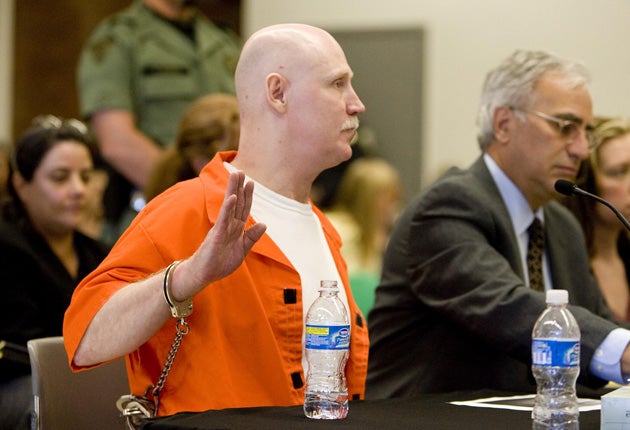Double murderer set to be last American killed by firing squad
On death row and running out of appeals, Ronnie Lee Gardner has chosen to be shot

His lawyers will keep appealing for clemency – to the US Supreme Court if necessary – but if it comes to death, the condemned double murderer Ronnie Lee Gardner has made his choice. He does not want to end his days with a lethal injection, like most inmates on America's death rows, but rather with the crack of a firing squad.
The execution of Gardner – who was convicted in 1985 of killing a lawyer while trying to escape custody during his trial in a Salt Lake City court house – will pile fresh scrutiny on the US death penalty at home and abroad.
Gardner's best chance of evading death vanished yesterday when the Utah Board of Pardons and Parole announced it was upholding the execution sentence after listening to testimony from both sides at commutation hearings.
And so just after midnight on Friday, the 49-year-old is due to be seated in the death chamber at Utah State Prison to face the five sharp shooters.
Utah is the only state to allow firing squads, widely seen as an unnecessarily brutal and archaic means of execution. Since 1976, when capital punishment was reinstated by the US Supreme Court, the state has sent two men to their deaths this way – Gary Gilmore in 1977, whose demise inspired Norman Mailer's novel The Executioner's Song, and John Albert Taylor in 1996.
A change in state law means that only those sentenced to death before 2004 have the right to choose how it happens. It could be, therefore, that Gardner's execution will be the last by firing squad. But it is a moment that death penalty opponents will seize upon.
"This is clearly a throwback to an earlier time, and people wonder, 'How can we still be doing that?'", said Richard Dieter, executive director of the Death Penalty Information Centre in Washington. "For the country, we do need to talk about this. We're gonna kill somebody. And we do that pretty regularly ... every week somebody's being executed in the United States."
The day he shot the lawyer, Gardner was on trial for the murder of a Salt Lake City bar tender, Melvyn Otterstrom. He was convicted of that murder also.
While his defence admitted to the Pardons Board last week that his record for 20 years had been "absolutely horrendous", they stressed he was now a changed man who wanted to use his own experiences to counsel troubled children to stay out of strife.
"He's acknowledged the harm that he's caused. He's expressed to you the remorse that he feels," defence lawyer Andrew Parnes told a commutation hearing last Friday. Gardner's case began to garner headlines in April, when a date for his execution was set. Asked by the judge to choose between lethal injection – the more common method in Utah – or the firing squad, Gardner was quick in his response. "I would like the firing squad, please."
The identities of the five marksmen chosen to be part of the firing squad will be kept secret, but it is certain they have already been practising for the execution. If and when the moment arrives, they will each receive a rifle, one of which will be loaded with a wax bullet. No one will know for sure whose rifle fires the fatal shot – a precaution designed to protect all of them from subsequent remorse.
If procedures are similar to those followed in the Taylor execution 14 years ago, Gardner will be strapped into a specially constructed chair, hooded and marked with a white target over his heart. He should not even hear the guns go off – the bullets will travel faster than sound.
The number of executions in the US has dropped from a peak of 98 in 1999 to 52 last year, in part because of the spiralling costs of operating death rows and also because advanced DNA forensics have uncovered a growing number of cases where death penalties have followed wrongful convictions.
However, opponents of the death penalty still face a battle to have it legally phased out.
In Utah, officials say the change in law to eventually end the firing squad option is not because of the damage it does to the state's image. (Utah was raw to criticism when Taylor was killed in 1996 because of the approaching Salt Lake Winter Olympics.)
They argue instead that choosing the death penalty gives inmates a shot if not at glory then at global notoriety that they would like to deny them.
Fourteen years after the Taylor execution, some of those who pulled the trigger that night have now spoken anonymously of their feelings to The Salt Lake Tribune.
All five men belonged to the Salt Lake Police Force. "I wrestled with the morality. I'm not a super-religious or spiritual person," one said. "I go to church every Sunday. I did wrestle with 'thou shall not kill.' But I still felt that it was part of my job."
Subscribe to Independent Premium to bookmark this article
Want to bookmark your favourite articles and stories to read or reference later? Start your Independent Premium subscription today.

Join our commenting forum
Join thought-provoking conversations, follow other Independent readers and see their replies